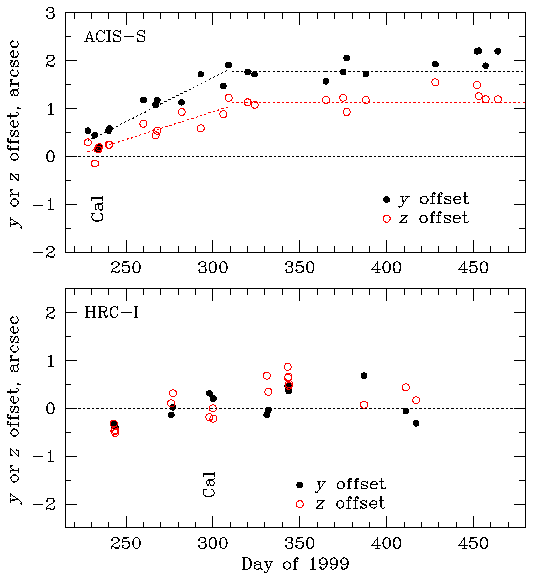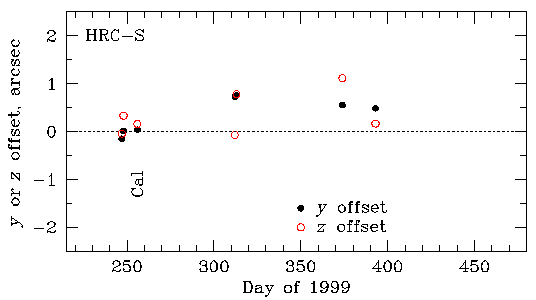ACIS-S and HRC absolute coordinate accuracy near
aimpoint
The plots below show deviations of the measured celestial coordinates from
the true ones as a function of time, to give an idea of the current residual
coordinate uncertainty near the aimpoint. We included only targets with
accurately known coordinates (from the Tycho catalog, from our own optical
measurement using Tycho reference stars, or from the radio interferometric
paper defining the ICRS coordinate system), and without apparent aspect or
fid light problems. The observations are processed using the latest
coordinate calibration (as of April 2000), except that the ACIS-S coordinate
drift has not been corrected for these plots, but the presently adopted
correction is shown. ACIS-I is still being studied (at present, the same
time-dependent correction is assumed for ACIS-S and ACIS-I).
In each panel, "Cal" marks the date of the aspect calibration
observation using the star cluster NGC 2516. The signs of the deviations are
defined as follows: a positive y offset means an X-ray source is
shifted from its expected position in the direction from chip S3 to S2; a
positive z offset means the source is shifted toward ACIS-I.
Dotted lines in the ACIS-S panel show the presently adopted
time-dependent correction (derived from the data in this plot prior to day
400). It appears satisfactory at present (the rms deviation is 0.3"
radius), but will obviously require updates. For HRC-I and HRC-S, the formal
rms deviation is 0.6-0.7" radius. There may be hints of a systematic
drift of the HRC coordinates as well, but since the errors appear to be
within ~1", it can probably be ignored for now. (There are too few HRC
observations with accurate target coordinates to make more detailed plots.)
Please note that these are coordinate errors near the aimpoint; there
are several presently uncorrected effects at large off-axis distances that
may result in systematic errors of up to a couple of arcsec.
Processing Note:
The time-dependent ASPECT alignment files, which correct for
the long-term coordinate drift were implemented in Automatic Processing on
2000-04-30T11:45:00, and in Custom Processing on 2000-05-01T16:00:00. This
happened with R4CU5UPD3, and CALDB version 1.1.
Maxim Markevitch (maxim@head.cfa.harvard.edu), 5/16/00
 (PS)
(PS)
 (PS)
(PS)